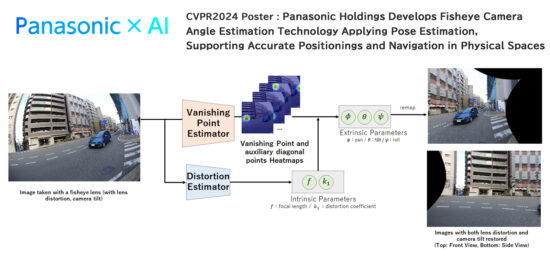Panasonic Holdings Develops Fisheye Camera Angle Estimation Technology Applying Pose Estimation, Supporting Accurate Positioning and Navigation in Physical Spaces

Osaka, Japan – Panasonic Holdings Corporation (Panasonic Holdings) has developed a novel camera calibration method that estimates accurate and robust camera angles from a fisheye image. These angles are essential for positioning and navigation in physical spaces.
Accurate travel direction estimation that aids in positioning and navigation in physical spaces enables self-driving for cars, drones, and robots. Specific measurement systems, such as gyroscopes, are generally attached as additional devices to cameras. However, downsizing, lightening, and reducing costs require a technology that accurately estimates travel directions using only image capture. To address the problem of angle estimation difficulty due to lens distortion from fisheye cameras, Panasonic Holdings developed a method designed for applications such as broad surveillance and obstacle detection. Specifically, this accurate and robust method based on pose estimation can address drastically distorted images under the so-called “Manhattan world assumption;” the assumption that buildings, roads, and other man-made objects typically are at right angles to each other. Since the method can be calibrated from a single general image of a city scene, it can extend applications to moving bodies, such as cars, drones, and robots.
The technology will be presented at the main conference of the IEEE/CVF Conference on Computer Vision and Pattern Recognition (CVPR) 2024, as a research outcome of the REAL-AI*1 program for developing top human resources in the Panasonic group. The conference will be held in Seattle, Washington, United States, from June 17 to 21, 2024. This conference is one of the top international AI and computer vision conferences.
Panasonic Holdings aims to contribute to helping customers’ lives and work through research and development of AI technology that accelerates social implementation and training of top AI researchers.